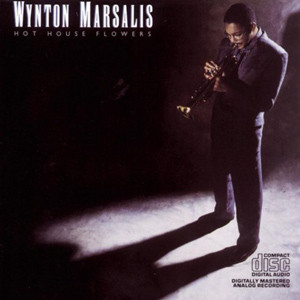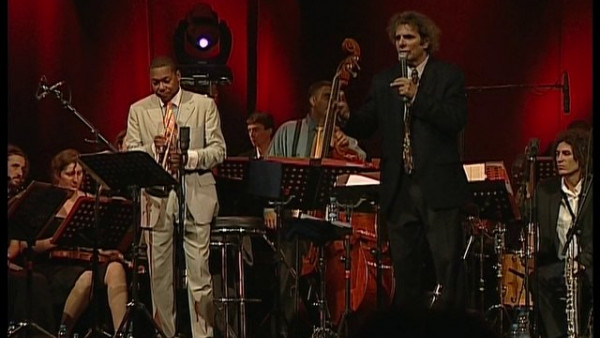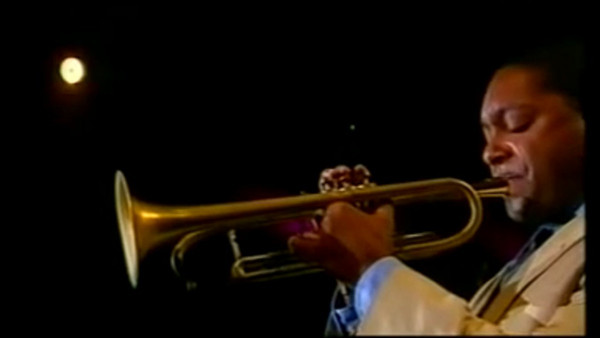Hot House Flowers
Saxophonist Branford Marsalis, flutist Kent Jordan, pianist Kenny Kirkland, bassist Ron Carter, and drummer Jeff “Tain” Watts join Wynton to conquer a venerable jazz tradition – swing with strings. They return from that battlefield to share the spoils with beautiful renditions of “Stardust,” “When You Wish Upon a Star,” “Melancholia” and “I’m Confessin,” among other classics, and some surprising originals, accompanied by a string orchestra arranged and conducted by Robert Freedman.

Album Info
| Ensemble | Wynton Marsalis Quintet |
|---|---|
| Release Date | December 18th, 1984 |
| Recording Date | May 30-31, 1984 |
| Record Label | CBS |
| Catalogue Number | CK 39530 |
| Formats | CD, Digital Download, LP |
| Genre | Jazz Recordings |
Track Listing
| Track | Length | Preview |
|---|---|---|
| Stardust | 4:12 | Play |
| Lazy Afternoon | 5:04 | Play |
| For All We Know | 6:20 | Play |
| When You Wish Upon a Star | 4:40 | Play |
| Django | 4:57 | Play |
| Melancholia | 5:09 | Play |
| Hot House Flowers | 5:51 | Play |
| I’m Confessing (That I Love You) | 5:39 | Play |
Liner Notes
Wynton Marsalis was about six months short of his 23rd birthday when these recordings were made. They show off his skills as serenading balladeer, as melodic and rhythmic alchemist, as contender for an important place in the history of clarion trumpet statements sometimes worthy of a singer, at others sounding almost as though they were lifted from a secret summit conference of great drummers and elite dancers. Hot House Flowers, then, is an especially good title. Good because this album seems fashioned, on one level at least, to celebrate the sweet riddles and modulated heats of romantic love. Also, intent on nurturing melodic blooms in apparently barren places. Plus: is the result of the golden-brown history of American trumpet, a history made in the audacious hothouses of rhythm and dead-eyed passions, where the enemy was never depth of emotion but the sentimentality and hysteria that made all forms of romance seem repulsive instead of inspiring and uplifting. This, then, is contemporary art bent on offering tools with which we can take on and shape the time fate has allotted. It sings and swings and stings with surprising authority, functioning as another sturdy alternative to the maudlin menaces of the human heart that we associate with most uses of strings outside the context of European concert music.
AS EVER, there are artistic achievements that can be discussed on their own terms and in the context of Wynton Marsalis’ tradition. Already many know he is gifted in two areas that have usually been considered exact opposites, jazz and European concert music. That he has made a name for himself in four years as a professional across the tops of both disciplines illustrates great talent and even more imposing potential. His 1984 Grammy awards for both jazz and classical music, his refusal to present himself in the narrow environment of rock beats and electronic instruments and silly clothes, all reveal him as surprisingly clearheaded. This recording, however, shows off fresh areas of Marsalis, a unique emotional depth for his age and a technical grasp far beyond mere virtuoso trumpet playing.
Here Marsalis meets the challenge of his surroundings and, through often collaborative arrangements with Bob Freedman, brings off an album far superior in its writing to that provided for a Charlie Parker or a Clifford Brown. As interpreter and improviser, Marsalis is presented as either featured lyric brass singer or as part of a small group expanded to a large ensemble, allowing for telling contributions from saxophonist Branford Marsalis, pianist Kenny Kirkland, bassist Ron Carter, and flutist Kent Jordan.
Throughout, Marsalis makes the trumpet amazingly flexible, matching his sound with that of the strings, so that the colors he gets on each song are individually tinted for the arrangement he moves through. There is the shocking bottom-of-the-heart register heard on “For All We Know,” the smooth slides and variety of attack he brings to “Lazy Afternoon,” the almost prayerful intimacy of “Melancholia,” or the nearly peerless richness of tone heard on “Stardust.” On the more pulsive tempos, he renews “I’m Confessin’” in a way that would probably delight Louis Armstrong: he gives a rich nobility to “Django” as he floats on the helium of passion and intelligence above the arrangement; and he delivers the title track (also written by him) with a tilting-toward-pelvic inspiration that allows for yet another example of marvelous work from the rhythm section.
In Stomping The Blues, Albert Murray observed that popular tunes are usually no more than sentimental folk music until jazz men transform them into quality art. “When You Wish Upon A Star” is a perfect example. If one has heard Marsalis’ small group arrangements, like “Twilight,” “Father Time,” and “The Bell Ringer,” from his first two Columbia Records albums, his hand is obvious almost throughout “When You Wish.” In this case, the arrangement clearly grows out of Marsalis’ conception of his small group’s sound. This interpretation, with its dramatic dynamic contrasts, its modulations, and its metric changes, extends the sound gotten by the trumpet and the tenor into a large ensemble, presenting a personalized story of jazz from the single horn to the small band to the orchestra. The superb rhythm section gives the piece, as it does all the selections, a specific character through something better described as spontaneous orchestration of a very high order instead of accompaniment. These three men think at every beat, anticipating, coloring, paraphrasing, and giving the music a resonance it would lack without them. If a job like this has been better done in recent memory than by Ron Carter, Kenny Kirkland, and Jeff Watts, I haven’t heard it. These men inspire the leader to one of his finest improvised outings. it is perfectly relaxed, making thoughtful contrasts between long phrases and short ones, the long starting and stopping in unusual places, the short setting up or developing material already laid out more elaborately. Every note is essential and the rhythms even include the appropriated drum triplets of Elvin Jones near the end. At its center is a sailing bittersweet joy that fuses his love for Louis Armstrong and Fats Navarro. It is a perfect introduction to Wynton Marsalis for all those who wonder what the talk is about.
Perhaps the key to this album’s success is that it is truly a jazz record, which means it contains a force evolved, at least in part, from the African’s obsession with percussive grace. This obsession Americanized allowed early jazz to help relocate Western popular dance to the human equator of the pelvis. The song at the center of this music is the result of a lyricism derived partially from the African bush, from the American field holler, the Negro Spiritual the ragtime revolution in American song, the blues, and the battalions of ideas expressed on those dirt dance floors, where physical rejoinders to adversity paint spirited storm shelters in the air of the midnight hour. But it all comes down or gets down to the needs of a man and a woman, that enraptured pair Ellington called “the world’s greatest duet.”
Yes, it all comes down, the harmonies full of idiomatic dissonance or siren sweetness, the notes that might as well have been stenciled with stardust on the night sky, the rhythms so celebratory, then the conjoined memories and dreams of the magic at the core of intimate majesty.
–Stanley Crouch
Credits
1. STARDUST
(H. Carmichael – M. Parish) Mills Music Inc.
2. LAZY AFTERNOON
(J. LaTouche) Chappett Inc. / Fisher Music Corp.
3. FOR ALL WE KNOW
(F. Coots) CBS Feist Catalog Inc.
4. WHEN YOU WISH UPON A STAR
(N. Washington – L. Harline) Bourne Co.
5. DJANGO
(John Lewis) M.J.Q. Music, Inc.
6. MELANCHOLIA
(D. Ellington) Tempo Music Inc.
7. HOT HOUSE FLOWERS
(W. Marsalis) Skayne’s Music
8. I’M CONFESSIN’ (THAT I LOVE YOU)
(A. J. Neiburg – D. Dougherty – E. Reynolds) Bourne Co.
BIEM/STEMRA
Original sound recording made by CBS Inc.
Producer: Steve Epstein
Executive Producer: George Butler
Chief Engineer (Recording and Mixing): Tim (“Cheem”) Geelan
Assistant Engineer: Dennis Ferrante
Recorded May 30th and 31 st, 1984 at RCA Studio A, New York
Recorded Digitally on Sony 24 Track PCM 3324 Digital Recorder
Mastering: Vlado Meller at CBS Recording Studios on the CBS DJsComputer™ System.
Remix and Editing: CBS Recording Studios, 49 East 52nd Street, N.Y.C.
Conductor / Arranger: Robert Freedman
Concertmaster: Charles Libove
Musical Contractor: Eugene Bianco
Art Direction: Mark Larson
Photography: Carol Friedman
Thanks to Rich Plushner and Gus Skinas of Sony Digital Audio
Special thanks: Tim Geelan, Steve Epstein, Genevieve Stewart, George Butler, Marilyn Laverty, Vernon Hammond, Delfeayo Marsalis, Billy Banks, Stanley Crouch, D.J.& everyone at “APA”, “The Brothers”, Ron Carter and Bob Freedman for the imaginative arrangements, Jack Rovner, Vernon Slaughter, Peter Gibbs
Personal Management:
Edward C. Arrendell
31 Fort Avenue, Suite 2
Boston, MA 02119
Personnel:
Wynton Marsalis, Trumpet
Branford Marsalis, Soprano and Tenor Saxophones
Kenny Kirkland, Piano
Jeffrey Watts, Drums
Ron Carter, Acoustic Bass
Kent Jordan, Alto Flute
The Orchestra:
Conductor / Arranger: Robert Freedman
Leader: Wynton Marsalis
Concert Master / Violin: Charles Libove
Violin: Ingrid Arden, Regis Iandiorio, Winterton Garvey, Louann Montesi, Guillermo Figueroa, Harry Glickman, Raymond Kunicki, Patmore Lewis, Diane Monroe, Peter Dimitriades, Gayle Dixon.
Viola: Al Brown, Theodore Israel, Mitsue Takayama, Harry Zaratzian
Cello: Fred Zlotkin, Seymour Barab, Richard Locker, Alvin Clinton Mccall
Bassoon: Andrew Schwartz
Tuba: Tony Price
Oboe And English Horn: Paul McCandless
French Horn, Peter Gordon
Personnel
- Branford Marsalis – tenor sax, soprano sax
- Jeff “Tain” Watts – drums
- Ron Carter – bass
- Kenny Kirkland – piano
- Kent Jordan – flute
- Robert Freedman – conductor, arranger
Also of Interest
-
 Videos
Videos
Stardust - Wynton Marsalis with the Toulouse Conservatory Orchestra at Jazz in Marciac 2005
-
 Videos
Videos
Stardust - Wynton Marsalis at Jazz in Marciac 1999
-
 News
News
Lincoln Center’s Man With the Trumpet, With Orchestra
-
 News
News
Wynton Marsalis: Reclaiming the Jazz Tradition
-
 News
News
Marsalis’ horn chases bad luck
-
 News
News
Wynton Marsalis, Young Lion of Jazz
-
 News
News
The Horn Of Plenty Of Wynton Marsalis
